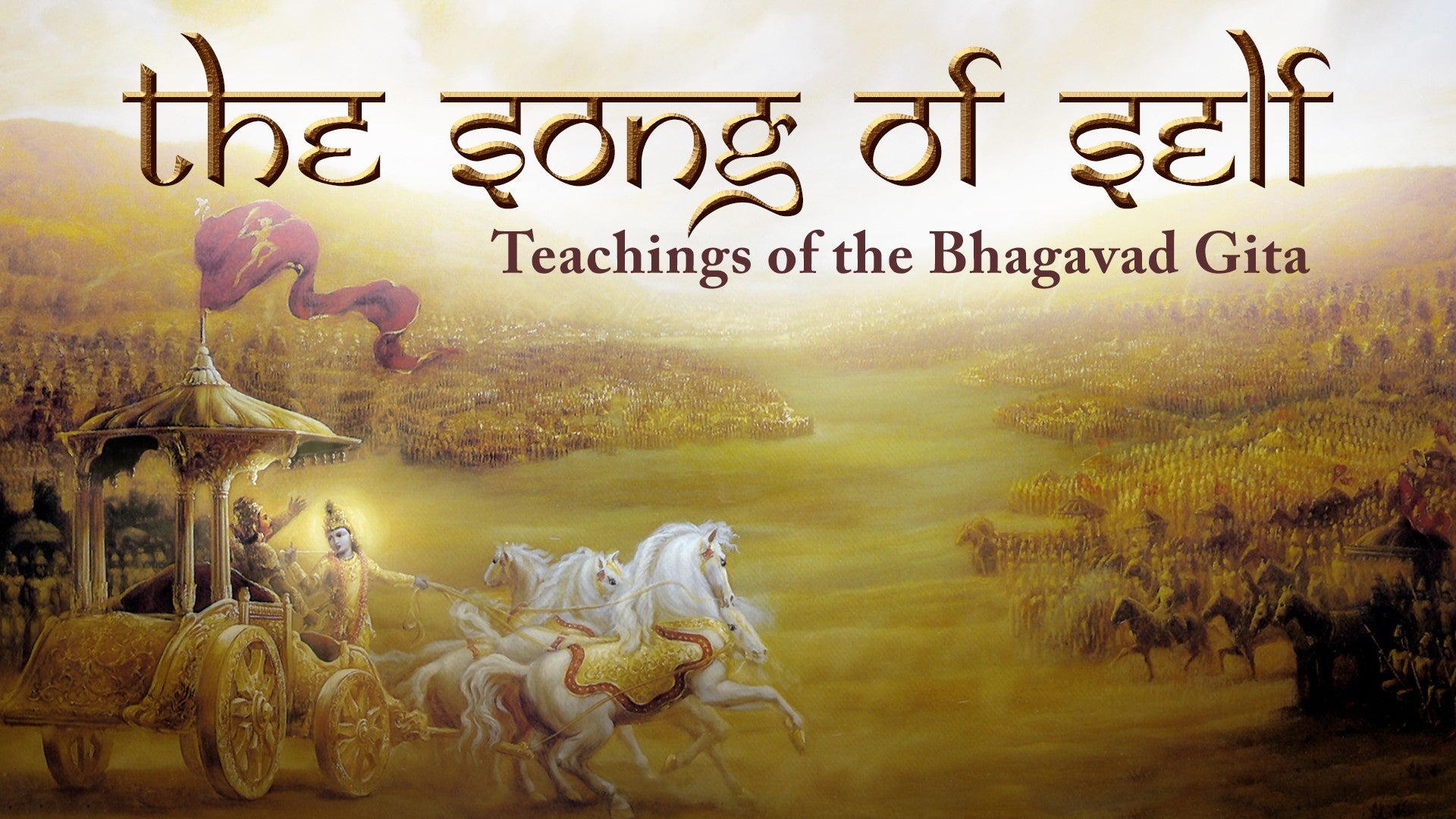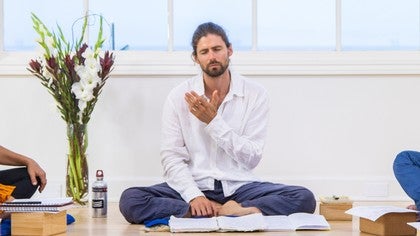Description
About This Video
Transcript
Read Full Transcript
So, Arjuna, having explained why he felt so overwhelmed, now something really significant happens and after him explaining why he feels so torn, the next couple of verses we can think it's almost like he surrenders and he makes it clear that he does not know what to do. So, it's like he owns the fact, he admits the fact that he can't see the clear way forwards and so he opens himself up to receive help. And this is what he says. So, he says, my essential nature has been struck by this fault of weakness and I don't know what to do. So, so I ask you, I ask you, about dharma, about what would be the way of dharma because I'm all confused about it, I can't see clearly. Yachreha, has a word that comes up a few times in the Gita, it means that which is optimal, that which is for the greater good, that which is for the good of all. So, that which would be for the good of all. Yachreha, nishchitam, without any doubt, bruhitamit, tell that to me. So, Krishna, please, I don't know what to do. I'm overcome by this weakness. I feel all torn and confused. I can't see the clear way forwards. Please tell me clearly without leaving any doubt. Spell it out for me. What is the clear way forwards through which I can do what is for the good of all. Shishasteyam, I am your student. Shaadimam tam prapanam, give me your shelter. So, I'm your student and give me your shelter. So, here something so significant happens. There's the idea in the Sanskrit tradition that if you're going to be a student, you have to make yourself what they call a patra. Now patra literally means a leaf. But maybe if you've been to India, particularly southern India, traditionally the vessels on which one would eat or from which one would drink would be fashioned from leaves. So, a patra is a vessel which is fit to receive something. So, I mentioned I would sometimes use my bottle. So, this is an instance. I like coconut water, for example. I spent a lot of time in South India and in Thailand where there is an abundant supply of fresh young coconut. And I'm rather partial to it. If my bottle is empty and my friend brings me a fresh coconut, we could pour it in here and fill it up. But imagine the water bottle is full of water. My friend brings the coconut and we pour it into the bottle. What happens? We cannot receive it. And this is the idea that when we want to receive new information, when we want to learn, when we want to study, we have to acknowledge that we don't quite know. We have to make space to receive that new input. And so here, Arjuna very clearly states, I do not know what to do. I am confused. I cannot see the clear way. I can't quite see. Please tell me, make it clear what would be for the greatest good. I am your student. Give me your shelter. And so he surrenders. Now you've seen me drop forwards here. So I think this is actually highly significant because maybe you can imagine you're in a difficult situation. Sometimes when you feel you're in a difficult situation, you get boxed.
You can see, oh, there's this option this way and there's this option that way. And you feel there's only two ways to go. And as you see, this one doesn't look very inviting and that one looks even worse. You feel more and more pressured. It's like you get backed into a corner. And in the corner, you can just see down that alley and that alley and they both look terrible. But if you relax and surrender, oh, there's all these other ways. So you might just surrender like this. And then all these other ways open up. And this is what Ajana does here, is he loosens his grip on what he thinks it has to be like. Because he sees two alternatives, neither of which seem good enough. And so then he slackens his grip on it's got to be one of these ways. And he asks the question, maybe there's another way. I can't see it yet, but please tell me. And so he asks Krishna to show him, to teach him, to tell him. One of the interesting thing in this verse is that Ajana says, nishchitan, brouhitan me. Tell me that thing, nishchita, clearly, without any doubt, make it clear what would be shreya for the greatest good. So here we are right at the beginning of the text. And here we are, it's the seventh verse of the second chapter. Krishna is the great master, the great teacher. But he's going to go on and speak for more than 600 verses. Ajana is saying here, please, tell me clearly, what's the right way? What's the best way? So if Krishna is the greatest teacher, why does he need to go on for so many hundreds of verses and talk about yoga from this perspective and that perspective? When Ajana is saying clearly, just make it clear what's the one clear way? So why is that? Sometimes in yoga one can meet a teacher who says there is only one way. Now when I first came across a teacher who said that I thought yes, and I know what that is, it's to run away from this because surely there must be more than one way. But actually if you cast it slightly differently, you can say really there is only one way. And the one way is your unique way. The way that is appropriate here and now in this particular circumstance. And the most, well one of the most beautiful things about yoga is that it has this breadth, it has this inclusivity. And so yoga doesn't deal in kind of strict rules or prohibitions. Instead it works with these very broad and inclusive principles that serve as references to help us navigate unknown territory rather than giving us a fixed prescription. Because the yogic masters observed nature and they observed life. And so they knew that it's always unpredictable. Many times you have to face the unknown. And so the teachings of yoga don't say always do this, always do that. Instead they just say always be present and cultivate the depth of awareness that will allow you to be as responsible as you possibly can. That will allow you to respond in the way that's most appropriate for that particular situation. And so yes, Krishna does go on and speak at great length but he's describing a way or a path that is inclusive and that can be useful for humanity. Because the teachers of the yoga, the great masters of the yoga tradition, they recognize that human beings, we're so diverse and we're all unique. And so the one way, if we can even call it that, of yoga is a very broad path. It's like a mighty river with so many streams. And then in the next verse, the eighth, Arjuna goes on and he says, I don't see what could possibly take away that sorrow which is drying up my very senses. He says, even if I were to receive or to win in the battle, the undisputed dominion of the whole earth and even of the heavens, I don't see how this could possibly take away my sorrow. So here significantly we get kind of a reminder of the purity of Arjuna's intent.
He's not in this for the fame or the glory or the riches or the territory. He's in it for Shreha, like you mentioned in the previous verse. He wants to do what's for the good of the whole, for the whole community, for the whole of his field. So he's not interested in that which is just going to be of short-term benefit for him. He wants to do what's really good for the whole. And so this verse, it reiterates the purity of his intent. He's not in it for any selfish motivation unless we say it's like a kind of a deeper level of selfishness in which is his deepest, highest interest. That's his motivation. He wants to do Shreha. He's not interested in winning this battle so he can have revenge or he can win any material thing. He just wants to do what's for the good of the whole. And so this verse really emphasizes that. So he's open. He's acknowledged that he doesn't know what to do. So he's made himself spacious and receptive to receive the teaching and he reaffirms that he only wants the guidance which is going to bring him to harmony. And then something very interesting happens.
The Song of Self: Bhagavad Gita: Chapter 2
Comments

You need to be a subscriber to post a comment.
Please Log In or Create an Account to start your free trial.











